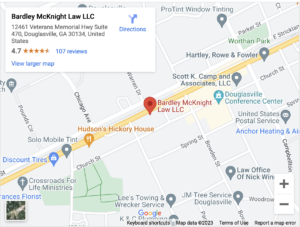
Mediation and arbitration are probably the two most popular forms of alternative dispute resolution (ADR). Unlike litigation, where a judge can haul you into court, participation in ADR requires the consent of all parties involved. Mediation and arbitration are frequently used in divorce, property division, and child custody cases.
Why Avoid Litigation?
Litigation occurs whenever a court gets involved with your legal matter. So why would you want to avoid litigation?
- Litigation is expensive. There are court fees to pay. Also, the more contentious your dispute, the longer it’s going to last and the more it’s going to cost.
- The emotional cost is high. Litigation can put you and your spouse on opposite sides, and the emotional toll is likely to add up to more than you might expect.
- If you don’t like the ruling, you probably won’t win an appeal.
- Litigated family law issues are not as friendly to creative solutions as agreed-upon resolutions can be.
All of this is not to say that there are not some advantages to litigation. On balance, however, most people prefer negotiation and ADR to courtroom litigation.
What is ADR?
“ADR” stands for alternative dispute resolution. Any form of dispute resolution other than litigation and negotiation probably qualifies as a form of ADR. Mediation and arbitration are almost certainly the two most popular forms of ADR.
What Are the Benefits of ADR Over Litigation?
ADR offers several advantages over litigation:
- Cost: As mentioned above, litigation is expensive. ADR is not necessarily cheap, but it’s generally more affordable than litigation, especially if you would otherwise go all the way to trial.
- Informality: The rules are simpler in ADR, and they are more flexible. ADR proceedings tend to be low-key, especially mediation.
- Flexibility: ADR is generally more “user-friendly” when it comes to scheduling. You might be able to schedule a proceeding on the weekend, for example.
- Speed: In court, the wheels of justice move slowly. ADR is typically much quicker because speed is one of the reasons that ADR became popular in the first place. The speed of ADR tends to lower costs even further.
- Confidentiality: Court proceedings are usually open to the public – not so with ADR. The public has no right to attend ADR proceedings, and mediation proceedings don’t appear on public records.
These are only a few of the many advantages of ADR.
General Comparison of Mediation and Arbitration
See below for a brief description of the distinguishing features of mediation and arbitration.
Mediation
Mediation is a three-party affair (at least) – that means the two disputants plus a trained mediator. The mediator will use their problem-solving skills to generate creative solutions that will (hopefully) be agreeable to both parties. However, it’s important to remember that a mediator has no coercive power – they cannot impose a solution on you. All they can do is encourage you.
Below is a list of some further features of mediation:
- It is a form of assisted negotiation.
- The exchange of information is voluntary and limited.
- The mediator helps the parties clarify the issues and their own interests.
- The proceedings tend to be informal and even allow for “brainstorming.”
- The parties are active participants in the process.
- Private communications with the mediator are permitted.
- It’s cheaper than arbitration.
- The solution is based on the needs of both parties.
With all of its advantages, it’s no wonder mediation is so popular.
Arbitration
“Rent-a-judge” is a humorous term for arbitration, and it is not at all inaccurate. Both sides must agree to arbitration in advance. You must also agree on the terms of the arbitration—who the arbitrator will be (or who will have the right to choose the arbitrator), what rules of evidence and civil procedure will apply, etc. However, once you agree to arbitration, the ultimate resolution of your dispute is up to the arbitrator.
Below is a list of some further features of arbitration:
- Arbitration often requires extensive discovery (where each party demands evidence from the other, and the tribunal enforces these demands).
- Arbitration proceedings are far more formal than mediation sessions.
- The parties testify under oath–meaning that perjury liability is possible.
- There is no private communication with the arbitrator.
- The decision is based on facts and evidence, not the parties’ needs.
- The win/lose competitive nature of arbitration often destroys any pre-existing relationships between the parties.
- Although the public cannot attend arbitration proceedings, arbitration decisions are publicly available.
Don’t forget that other forms of ADR are available–conciliation, for example.
Using Mediation in Family Law Cases
Meditation sounds nice to most people, but the real question is whether it will work to resolve your particular dispute. Mediation works well when there is a need to create flexible plans. It often works for child custody, creating a parenting plan, property division, child support, etc. Mediation tends not to work if the parties are hostile or conflict-prone, as is often the case in a divorce.
Using Arbitration in Family Law Cases
The main advantage of arbitration in divorce and child custody cases is the fact that the parties can select an arbitrator from a particular field of expertise. The arbitrator might be an expert on mental health issues, child psychology, property division, etc.
The biggest problem with arbitration in child custody cases is that public courts are more than willing to overturn an arbitrator’s decision if they believe it’s in the best interests of the child to do so.
Arbitration might be the only viable alternative to litigation if the parties are hostile or conflict-prone.
Choosing Between Mediation and Arbitration
So which is better–mediation or arbitration? That depends on you:
- Mediation is better if you intend to maintain good relations with the opposing party over the long term. You might need to maintain civility with your ex-spouse, for example, when it comes to raising your children. Mediation also offers flexible solutions and the possibility of creative compromise.
- Arbitration, by contrast, tends to be quicker than mediation, although this is not always the case. Since the parties can select the arbitrator, you can choose someone who is an expert in the field from which the dispute arose. However, you do face the risk that you won’t like the arbitrator’s decision.
An appeal is pretty much out of the question, no matter which option you choose. With mediation, you won’t want to appeal a decision that you agreed to. Meanwhile, it’s almost impossible to appeal an arbitrator’s decision unless you can prove corruption or the “best interests of the child” are involved.
Contact an Experienced Douglasville Family Law Attorney for Help Resolving Your Legal Matter
Whether you end up resolving your dispute through negotiation, litigation, mediation, or arbitration, an experienced Douglasville family lawyer can guide you through the process. The sooner you act, the better your chances of securing a favorable outcome.

